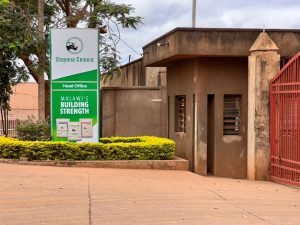SEEKING TRUTH AMIDST TRAGEDY: INVESTIGATING POTENTIAL MISCONDUCT IN UNSOLVED FIRE CASES

A Burning Ministry of Agriculture Headquarters in Lilongwe
BY KANDANI NGWIRA
When unexplained events occur, such as the series of fires that have repeatedly devastated markets and government offices in Malawi, people naturally search for explanations.
The lack of official closure in these cases often leads to public speculation, giving birth to various conspiracy theories.
These theories, while not grounded in confirmed evidence, reflect a community’s attempt to make sense of persistent, unsettling phenomena.
This pattern underscores the importance of transparent investigations and clear communication from authorities to prevent misinformation and maintain public trust.
Since 2012, a series of mysterious fires have repeatedly struck government offices and public markets across Malawi, yet no arrests have been made in connection with these incidents.
In each case, authorities have cited faulty electrical connections as the primary cause post-investigation.
However, this explanation came under scrutiny in October 2013 when a fire severely damaged the headquarters of the Electricity Supply Corporation of Malawi (ESCOM).
Questions arose about how an organization staffed with electrical experts could experience such an oversight. This incident further fuelled public scepticism and raised concerns over the adequacy of the official accounts regarding the true causes of these recurring fires.
This incident at ESCOM’s headquarters intensified public speculation, leading to the emergence of conspiracy theories.
These theories suggest that the fires might be acts of sabotage, deliberately set to destroy documents and evidence, potentially covering up wrongdoing. In response to these growing concerns, a thorough investigation was initiated to explore these claims. This investigative effort aims to determine the veracity of these theories – are they merely rumours, or is there a substantive basis to these suspicions?
Tikwere Building on Fire.

The investigation was triggered by a significant fire that devastated Tikwere Building in Lilongwe on May 20th, 2023.
Hosting key government entities, including the Ministry of Lands, Lands Registry, and the Government Contracting Unit within the Office of the President and Cabinet (OPC), this building plays a vital role in Malawi’s administrative framework.
In the aftermath of the blaze, Minister of Information and Digitalization Moses Kunkuyu addressed the nation. In his press statement dated May 21st, 2023, Kunkuyu assured Malawians that all critical documents from various government ministries, departments, and agencies were securely backed up in electronic formats, thereby mitigating the impact of the fire on governmental operations.

The government sought to alleviate concerns following the fire at the Tikwere Building.
“The nation can be assured that all information from the Ministry of Lands is intact, as it is digitally backed up in the Ministry’s Land Information Management System. Therefore, there should be no worries about any alleged loss of information for nefarious reasons,” the official statement declared.
This assertion appears to diminish the likelihood of foul play, or at least suggests that if such intentions existed, they were not realized. However, this is not the first time such assurances have been issued; similar statements were made following previous fires in government offices, raising questions about recurring patterns and the effectiveness of such security measures.
Fire at the Ministry of Agriculture

In a notable incident in February 2017, a fire severely damaged the office of the Ministry of Agriculture and Irrigation and Water Development at Capital Hill.
The blaze originated in the office of then-Minister George Chaponda and rapidly spread to adjacent offices, including those of the principal secretary and various ministry directors. At that time, Chaponda was embroiled in a corruption case concerning maize importation from Zambia.
While suspicions arose that the fire might have been set to destroy evidence related to the case, official investigations attributed the cause to faulty electrical connections.
Subsequently, Chaponda was acquitted of all charges. This incident raises the question: was it merely a case of faulty wiring, or could there have been a more sinister motive behind the fire?
Fire At ACB Offices
Barely seven months after the agriculture ministry fire, in October 2017, another significant fire incident occurred, this time at the offices of the Anti-Corruption Bureau (ACB) in Malawi.
The fire, which broke out around 6 a.m., initially engulfed office equipment but was rapidly addressed. G4 Security personnel played a crucial role in controlling the blaze, employing hose pipes through windows to douse the flames.
Their prompt action was instrumental in containing the fire until the Lilongwe City Council Fire Brigade arrived to assist in extinguishing it fully.
When images of the fire at the ACB offices circulated on social media, they sparked widespread concern among Malawians. Many feared that the blaze could have destroyed crucial evidence and case files, particularly those involving high-profile individuals and politicians that the ACB was actively investigating at the time.
In response to these apprehensions, Reyneck Matemba, then Deputy Director of the ACB, sought to reassure the public.
Speaking to ‘Nation on Sunday’ on October 15th, Matemba clarified that the fire had only damaged some inconsequential office papers in a room filled with electrical equipment. He emphasized that important case files and evidence were unharmed.
The investigations into the fire at ACB offices concluded that faulty electrical equipment was to blame.
However, this explanation has not quelled public speculation. Questions linger: Was this simply a natural fault, or could there have been deliberate tampering with the electrical system? The possibility of such tampering, potentially aimed at destroying case files and compromising the ACB’s operations, remains a topic of concern. What really happened behind the scenes of this incident remains a matter of debate and investigation.
Fire at Escom

In a notable incident from October 2013, a fire severely damaged the ESCOM headquarters in Blantyre, affecting multiple floors. Remarkably, a decade later, the building remains unrepaired.
The investigation into the fire’s cause, conducted by Incendium Fire Investigation, a South African firm, encountered challenges.
They reported “insufficient interpretable fire patterns’ during their interior inspection, making it difficult to pinpoint the exact origin of the blaze. However, based on the physical evidence and accounts from the payroll office staff and a security guard, the investigators suggested the fire might have originated from an ‘electrical failure or overheating of a multi-plug adapter or its wiring.”
“This adapter,” they noted, “was energized during the fire and situated near combustible materials, indicating a potential accidental cause.”
The report further stated: “The pre-fire status of the electrical appliances could not be verified due to the listed constraints, and the fire cause is classified as undetermined.”
This statement marked the conclusion of the formal investigation into the ESCOM fire. However, this inconclusive end leaves open questions: Is this the entirety of the story? Are there underlying factors or elements that remain unexplored or undisclosed?
Fire At MEC Warehouse in Lilongwe

On July 15th, 2014, a major fire engulfed the Malawi Electoral Commission’s warehouse, situated adjacent to the Central Government Stores and Government Print Warehouse.
This devastating blaze resulted in the loss of approximately 1,500 ballot boxes, along with a variety of electoral materials and gas cylinders.
Notably, these materials were from the Lilongwe City South East Constituency, an area where election results were at that time hotly contested and under significant dispute.
According to a report by Paida Mpaso and Rebbeca Chimjeka in the Nation News on July 16th, 2014, the fire at the Malawi Electoral Commission warehouse was allegedly started by four individuals who identified themselves as monitors from the Democratic Progressive Party (DPP).
The report included an interview with Thokozani Kanthiti, a monitor from the Malawi Congress Party, who was present at the warehouse as part of the security detail. Kanthiti recounted to the Nation that around midnight, these four individuals entered the warehouse shortly before the fire erupted.
“Soon after the four people who said they were part of the monitoring team had left us, they went behind the building, and all of a sudden, we heard an explosion. There was fire, and when my colleagues and I went round the back, the guys hurriedly left, and the gas cylinders started exploding,” Kanthiti recounted.
He further reported that the four individuals fled the scene in a Toyota Carina with a red registration number. Despite the presence of police officers who witnessed the event, these individuals were not apprehended and have not been seen since. This raises critical questions: Who were these people? Why were they not arrested by the police at the scene?
Fire Guts Down Markets 24 Times No Suspect, No Arrest

Records from 2012 to 2023 reveal a troubling pattern: markets across Malawi have been ravaged by fire 24 times, with causes ranging from electrical faults and recklessness to suspected foul play. This trend persisted into the current year, with Ndirande Market partially burning down in August, followed by a fire at Dyeratu Market in Chikwawa in September.
The years 2015 and 2016 were particularly disastrous. In 2015, six markets, including Vigwagwa in the city of Mzuzu (which suffered fires twice), Kasungu, Mzimba, and Mzuzu, were destroyed. The following year, fires devastated five markets – Ngabu, Bangwe, Salima, Lilongwe Central, and Mchinji.

In the cases of the Vigwagwa and Blantyre Market fires, there were suspicions of foul play, particularly involving petrol bombs. This was highlighted in a report by Nation Publications Limited on October 31st, 2019. Lloyd Chitsulo, the author of the story, cited allegations of arson.
Market Chairperson Samson Mulangeni was quoted saying, “The fire was caused by someone who threw a petrol bomb because the guard heard something falling in the market and the fire started around 11 pm.”
These eyewitness accounts and suspicions add a layer of complexity to the understanding of these fires, suggesting potential deliberate actions rather than accidental causes.
Notably, Blantyre Market, Mzuzu Market, and Vigwagwa stand out as having been particularly hard-hit by these incidents, each having been gutted down three times.
For most of the other market fires, the causes have been officially attributed to electrical faults or instances of general recklessness. This recurring pattern in these specific markets raises questions about the underlying factors contributing to their vulnerability to fires.
Robert Chasowa Report Gives Hint on Who is Behind the Fires
The Robert Chasowa Report, released in 2013 during Joyce Banda’s government, provides crucial insights into the individuals or groups responsible for some of the fires.
According to information found on page 50 of the report, which cites an anonymous source recalling a meeting held at the DPP headquarters in Blantyre, it was revealed that they were involved in the arson attacks on Rafiq Hajat’s office and the Balaka Market.
“The Commission was told by a DPP functionary that after the 20th of July demonstrations, there were several meetings at the Blantyre District DPP office. At one of the meetings, there were misunderstandings, which led to a fight. In the course of the fight, a well-known youth cadet was heard saying, “he was going to reveal everything because the people were being childish”.
The witness later inquired from the cadet what he meant by what he said. He was told that the cadet had been attending meetings planning to silence (“kumpwhetsa”) Robert Chasowa, who was causing problems at the Polytechnic. The cadet also told the witness that he was involved in torching the late Rafiq Hajat’s Office and Balaka Market”.
We inquired with the police regarding their efforts to pursue this lead in order to identify the individuals responsible for the fires. However, as of now, we have not received any feedback or updates from the police on this matter.
BCC Says Its Engineers Are Working on Fixing Wiring in the Markets
Blantyre City Council’s Chief Executive, Denis Chinseu, has stated that the council conducts routine inspections in markets to address any electrical faults as a preventive measure against accidents. This proactive approach is essential because the financial losses resulting from such incidents can be substantial.
Chinseu explained, “BCC has a dedicated electrical section as part of its establishment. Our officers are regularly deployed to markets for inspections. In the case of Blantyre City, approximately 10% of fires can be attributed to electrical faults, while the remaining 90% are primarily caused by human factors, specifically the improper disposal of burning charcoal.”
Furthermore, he mentioned the council’s role in insuring the market infrastructure since it is council property. However, Chinseu also encouraged vendors to consider insuring their individual properties. He emphasized that as a council, they can facilitate connections with insurance companies to ensure that vendors receive fair insurance options.
This analysis has been published as our secondary story. We remain committed to uncovering the truth behind the mysterious fires plaguing our country. If you possess any information that could contribute to our in-depth investigation, please do not hesitate to contact us at gregorygondwe@protonmail.com. Your cooperation is greatly appreciated.





